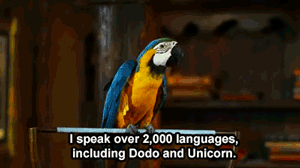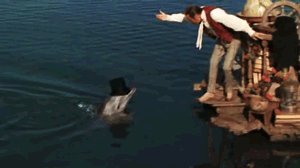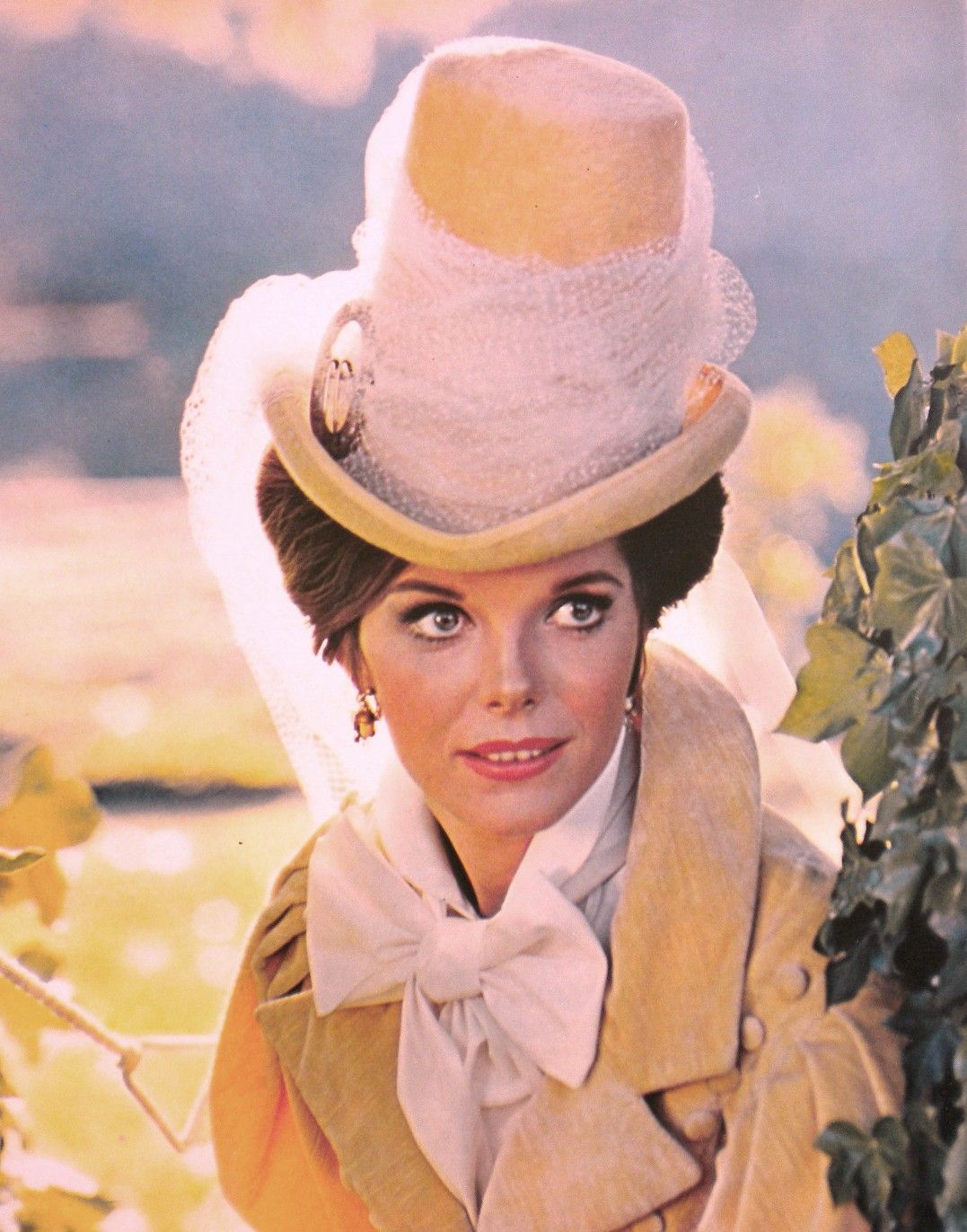Considerado um dos piores (se não O pior) indicados ao Oscar de Melhor
Filme, “O Fabuloso Doutor Dolittle” também representou o ponto mais baixo da
carreira do grande Rex Harrison. Mas, querendo ou não, eu adoro este filme. É meu “guilty pleasure”. E nem posso dizer
que o que sinto é uma nostalgia de quem viu um filme na infância e não liga
para a qualidade real da obra, porque eu só fui ver as infames aventuras do
médico que fala com os animais quando eu tinha 20 anos.
Considered
one of the worst (if not THE worst) films to be ever nominated to the Best
Picture Oscar, “Doctor Dolittle” also represented the lowest point in Rex
Harrison's career. I can't help but love this film. It is my guilty pleasure.
And I can't even say that it is a nostalgic feeling of someone who saw this
film as a child and doesn't care for the real artistic qualities, because I
only saw the infamous adventures of the doctor who talks to animals when I was
20.
John Dolittle (Rex Harrison) é um veterinário que fala com os animais.
Seu maior objetivo no momento é encontrar o misterioso caracol rosa gigante
(“Great Pink Sea Snail”). Já dá para imaginar como o filme vai ser bizarro.
Junto com ele vão Emma Fairfax (Samantha Eggar), Matthew Mugg (Anthony Newley)
e o garotinho Tommy Stubbins (William Dix). Antes de partir, ele conta a seus
novos amigos que foi com a ajuda do papagaio Polinésia que ele, um médico
comum, aprendeu a se comunicar com os animais.
John
Dolittle (Rex Harrison) is a veterinarian who talks to animals. His biggest
goal at the moment is to find the mysterious Great Pink Sea Snail. For this
alone you can imagine how bizarre the film is. Accompanying him there are Emma
Fairfax (Samantha Eggar), Matthew Mugg (Anthony Newley) and the little boy
Tommy Stubbins (William Dix). Before leaving, he tells his new friends that he,
a common doctor, learned to talk to animals with a little help from the parrot
Polinesia.
Embora estar cercado de animais possa parecer um sonho para muitos (e
certamente é um prazer para o doutor Dolittle), o que aconteceu nas gravações
foi um pequeno inferno na Arca de Noé. Rex Harrison foi ferido diversas vezes
pelos animais e serviu de vaso sanitário para as ovelhas urinarem. Esquilos
comeram parte do cenário, um esquilo desmaiou depois de tomar gim e uma cabra
comeu o roteiro. Polinésia, o papagaio, aprendeu a dizer “corta” e atrapalhou a
gravação de um número musical, fazendo com que Harrison dissesse, bem-humorado:
“é a primeira vez que eu sou dirigido por um papagaio!”.
Although
being sorrounded by animals may sound like a dream for many (and it certainly
is a pleasure for doctor Dolittle), the shooting was like a small hell in
Noah's Ark. Rex Harrison was hurt several times by the animals and was used as
a toilet by sheep. Squirrels ate part of the set, a squirrel passed out after
drinking gin and a goat ate the script. Polinesia, the parrot, learned to yell
“cut” and interrupted the shooting of a musical number, to what Harrison, in a
good mood, answered: “it's the first time I'm directed by a parrot!”
E por que “O Fabuloso Doutor Dolittle” foi um fracasso? Talvez por sua
duração exagerada (152 minutos)? Ora, “Mary Poppins” (1964) tem 144 minutos e
tudo mundo ama Mary Poppins! Seriam os animais (em especial o caracol rosa que
não é rosa)? Não, todas as crianças adoram animais, e o dito caracol ajudou o
filme a ganhar o Oscar de Melhores Efeitos Especiais (a lhama de duas cabeças
“Pushmi-Pullyu” já é outra história). Hum, talvez a história inverossímil e
cheia de reviravoltas em circos, tribunais e hospícios? Talvez, talvez...
Why
was “Doctor Dolittle” a disappointment? Maybe because it was 152 minutes long?
Well, “Mary Poppins” (1964) is 144 minutes long and everybody loves Mary Poppins!
Were the animals the cause (in special the pink snail that wasn't pink)? No,
all kids love animals, and the said snail made the film win the Best Special
Effects Oscar (the two-headed llama Pushmi-Pullyu is something eles). Maybe it
was the unbelievable story, full of plot twists in circuses, courts and
asylums? Maybe, maybe...
Mesmo o fato de Dolittle ser um homem que gosta mais de animais do que de
pessoas (nas próprias palavras do médico) já foi apontado como uma das causas
do fracasso do filme. Em um ano dominado por “No Calor da Noite / In the Heat
of the Night”, que ganhou 5 Oscars, foi surpreendente ver “O Fabuloso Doutor
Dolittle” com nove indicações e dois prêmios – um deles, o de Melhor Canção
Original pela adorável “Talk to the Animals”. Truman Capote, enfurecido pelo
filme “A Sangue Frio”, baseado em seu livro, não ter sido indicado ao Oscar,
disse na ocasião: “Anything allowing a
Dolittle to happen is so rooked up it doesn’t mean anything!”.
The
fact that Dolittle was a man who likes animals more than people (he says that
in the movie) was also cited as one of the causes for the film’s box-office
failure. In a year dominated by “In the Heat of the Night”, a film that won 5
Oscars, it was a surprise to see “Doctor Dolittle” with nine nominations and
two awards – one of them being Best Original Song for the adorable “Talk to the
Animals”. Truman Capote, angered because the movie “In Cold Blood”, based on
his book, wasn’t nominated to the Oscar, said: “Anything allowing a Dolittle to happen is
so rooked up it doesn’t mean anything!”.
Talvez a maior crítica feita ao filme seja o fato de Rex Harrison não
saber cantar. Talvez a escolha de um cantor profissional para o papel
protagonista tivesse sido mais interessante. Eu, pessoalmente, adoraria ver
Frank Sinatra ou Bing Crosby como Doutor Dolittle! (Pense bem: Sinatra seria a
escolha mais FASCINANTE possível para o papel!).
Maybe
the biggest criticism made to the film is that Rex Harrison can’t sing. Maybe
it’d have been more interesting if a professional singer was chosen instead. I,
personally, would love to see Frank Sinatra or Bing Crosby as Doctor Dolittle!
(Think: Sinatra would have been the most FASCINATING choice for the role!).
 |
| Quem quer um boneco do Rex Harrison? / Who wants a Rex Harrison doll? |
Mas a polêmica é maior: Rex Harrison aceitou o papel porque trabalharia
novamente com o letrista Alan Jay Lerner, de “My Fair Lady”, peça que rendeu um
Tony e um Oscar a Rex (e não é uma estranha coincidência que o nome da protagonista
de “My Fair Lady” seja Eliza Doolittle?). Mas Lerner foi demitido na
fase de pré-produção e, devido às suas reclamações, Rex perdeu o emprego pouco
depois. Mas, ao saber que Christopher Plummer poderia ser seu substituto, o bom
e velho Rex Harrison foi pedir o papel de volta. Mesmo assim, Plummer recebeu
os 300 mil dólares do contrato. Outras opções para o papel principal eram Alec
Guinness, Jack Lemmon, Peter Sellers e Peter Ustinov (eu escolheria Jack
Lemmon).
But
there is more trouble: Rex Harrison only accepted the role because he’d work
again with lyricist Alan Jay Lerner, from “My Fair Lady”, a play and movie that
gave a Tony and an Oscar to Harrison (and isn’t it a weird coincidence that the
lead of “My Fair Lady” is named Eliza Doolittle?). However, Lerner was fired
during pre-production and, after complaining, Rex Harrison was also fired. When
he learned that Christopher Plummer could replace him, good old Rex begged to
have the role back. Plummer received 300 thousand dollars anyway, because he
had signed a contract. Other options for the role were Alec Guinness, Jack
Lemmon, Peter Sellers and Peter Ustinov (I’d have picked Jack Lemmon).
Logo após o sucesso estrondoso de “A Noviça Rebelde / The Sound of Music”
(1965), a Fox decidiu investir em musicais grandiosos. Foram três tentativas, e
todas fracassaram. “O Fabuloso Doutor Dolittle” foi a aposta de 1967, enquanto
em 1968 a grande produção era “A Estrela / Star!”, com Julie Andrews, e em 1969
foi a vez de “Hello, Dolly!”, estrelando Barbra Streisand e com direção de Gene
Kelly.
Right
after “The Sound of Music” (1965), which was a huge triumph, Fox decided to
invest in big musicals. Three attempts were made, and all three failed. “Doctor
Dolittle” was the 1967 attempt, while in 1968 the big production was “Star!”,
with Julie Andrews, and in 1969 it was “Hello, Dolly!”, syarring Barbra
Streisand and directed by Gene Kelly.
O personagem doutor
Dolittle foi inventado por Hugh Lofting nas trincheiras da Primeira Guerra
Mundial, de onde ele escrevia cartas esperançosas para os filhos. As histórias foram publicadas em
1920, com sucesso instantâneo, e serviram de base para um desenho animado
alemão de 1928 e uma série de rádio na década de 1930. A personagem Emma não
existia nos livros e foi criada exclusivamente para adicionar romance ao filme.
E que romance: ela é cobiçada ao mesmo tempo por Dolittle e Matthew!
The
character Doctor Dolittle was invented by Hugh Lofting when he was fighting in
World War I, and wrote, from the trenches, hopeful letter to his children. The
stories were published in 1920, with instant success, and inspired a German
cartoon in 1928 and a radio series in the 1930s. The character Emma didn’t
exist in the books and was created to add romance to the movie. And what a
romance: she is courted by both Dolittle and Matthew!
Mas vamos analisar com calma: “O Fabuloso Doutor Dolittle” é um belo
filme, não apenas visualmente. As músicas são adoráveis, embora não memoráveis,
e Rex Harrison dá ao médico ares de gentleman
poliglota. O modo como os nativos africanos são retratados, como homens
inteligentes, vai na contramão dos costumes da época e também dos livros de
Hugh Lofting. E pensar que o papel do rei William Shakespeare X (Geoffrey
Holder) tinha sido oferecido para Sidney Poitier!
But
let’s analyze it with calm: “Doctor Dolittle” is a beautiful film, and not only
visually speaking. The songs are adorable, although not remarkable, and Rex
Harrison makes the doctor look like a multilingual gentleman. The way the
African people is portrayed, as intelligent men, is the opposite of what was
expected at the time, and also the opposite of what can be found in Hugh
Lofting’s books. Imagine that the role of king William Shakespeare X (Geoffrey
Holder) was offered to Sidney Poitier!
Esqueça o que foi dito sobre “O Fabuloso Doutor Dolittle”. Veja o filme.
Se este post de defesa de um filme tão adorável não foi capaz de convencer você
de que vale à pena vê-lo, talvez estes créditos iniciais fofos o convençam:
Forget
about what has been said about “Doctor Dolittle”. Watch the movie. If this
article defending such an adorable film wasn’t enough to convince you that it
is worth watching, maybe these cute opening credits can convince you:
This is my contribution to the “1967 in Film”
Blogathon, hosted by Ruth at Silver Screenings and Rosie at The Rosebud Cinema.








13 comments:
eu tb amo esse filme. passou essa semana no telecine cult. beijos, pedrita
I greatly enjoyed your write-up on this film -- it's not a masterpiece, it's true, but it holds a very special place in my heart. My mother took me to see it on my birthday when I turned 5. I'll never forget the push-me-pull-you!! Great pick.
Le, you've sold me on this film! I've never seen the whole thing because I couldn't really get into it. But, thanks to your post, I'm giving it another go.
I wonder how Peter Sellers would have been in this role??
Admit to not being a fan of the film. I found it very draggy as a child and haven't been willing to revisit it in my adulthood. Although, Fleischer is an interesting director with some real greats and some real bombs.
It has been years since I saw Dr. Doolittle. In America, there is given out an award each year, the Newberry Award, for the best children's literature book and I noticed at our local library, on a poster honoring Newberry Award winners, that The Voyages of Dr. Doolittle won the award in 1923. I am planning on having my 11 year old son read the book soon, and then we can rent the movie. Thanks for your post!
Must admit that I've never seen this as I've always been put off my the reviews and I thought it only held nostalgic pleasure if you'd seen it as a child. Maybe you've convinced me - after all, who can say no to a giant pink snail?!
Eu amo este filme; isso me lembra da minha infância! Obrigada por postar :)
I never understood why Doctor Dolittle had been panned by so many critics either, my sister and I think it is a delightful film and we've seen it too many times to count. I always wished they had changed the lead boy though, they really needed a boy with a much more engaging personality. Had Rex Harrison been nixed for the role, David Niven would have been a great choice for a replacement. Great review Le! I really enjoyed the behind-the-scenes tidbits you threw in too. :-)
P.S : Who wants a Rex Harrison doll? I'd love one!
I've never seen this film in its entirety but you've managed to convince me to give it a go! Lovely and really informative piece, thanks for choosing this to write about for the blogathon!
I'm mostly not a fan of Doctor Doolittle, but I do have some fond memories of it from my childhood. I had to learn "Talk to the Animals" for school choir one year.
The productions sounds hilarious. I love the details you include: "a squirrel fainted after drinking gin and a goat ate the script." I don't think I can read that line enough times:) I've never seen the film, but I did read the story many, many years ago. I wonder if it's just that Harrison is hardly a lovable type, like Julie Andrews. It's hard to imagine him the type of sensitive human who could talk to animals, isn't it?:) I'd much rather see him uttering wisecracks. Great contribution! Leah
Oh, it's been decades since I've seen this, but I still recall not liking it as much as some of the other family pictures of the era. I think that genre really wound down by the end of the decade and this was one of the movies that kind of help kill it off.
Still, it's a masterpiece compared to the horrid remake with Eddie Murphy, so I guess it gets points for that. Excellent review, by the way!
It was fun watching this recently on @TCM. I hadn't seen it since I was a kid. It reminded me of my grandparents' home because it seemed that's where I was whenever it was broadcast on tv during those childhood summers. Great memories. Nice post!!
Post a Comment